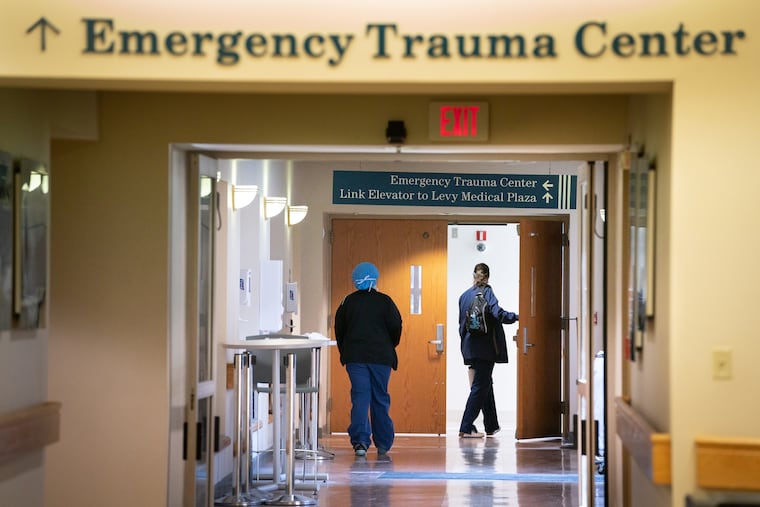Jefferson Abington Hospital cited for security guard’s excessive force against a patient
Video footage shows that the patient was not acting aggressively or attempting to leave the building.

A Jefferson Abington Hospital security guard wrestled to the ground a psychiatric patient and held down the patient’s head and neck until a stretcher arrived.
A hospital employee later heard the guard “gloating” about how having “had to slam somebody,” according to a state inspection report.
Inspectors concluded that the security guard used excessive force against the patient in the April 23 episode, which drew one of the Pennsylvania Department of Health’s most serious warnings. The patient had been wandering the halls of the hospital’s emergency trauma center, wearing a blanket and not acting aggressively or trying to escape the building, video surveillance showed.
The immediate jeopardy warning, a sign of life-threatening safety problems, was issued during a May 16 inspection and lifted a day later, after hospital administrators submitted a plan to update the hospital’s excessive-force policy and retrain staff.
The inspection report does not say what happened to the patient, who had been involuntarily committed for psychiatric care, or whether the security guard was disciplined.
“Jefferson Health is committed to providing our community with the highest standard of care,” Damien Woods, a spokesperson for the health system, said in a statement.
The Montgomery County hospital has been cited two other times this year for safety violations related to a patient falling and power cords in behavioral health rooms that inspectors said were a strangulation risk.
» READ MORE: Six months of inspections Jefferson Abington Hospital: October 2023 to March
Excessive force against a patient
The report does not identify the patient’s age, gender, or race, or indicate what the person was being treated for. But video surveillance reviewed by inspectors and detailed in the report shows how the episode unfolded.
A patient wrapped in a blanket was walking down a hallway about 11 p.m. and was stopped by a security guard, who attempted to block the person’s way. The guard bumped the patient with a hip, starting an altercation, according to the report.
The patient struggled “to fight off” the guard and bit the guard’s arm. The two wound up on the floor. Surveillance footage showed the guard on top of the patient, holding down the patient’s head and neck, until a stretcher arrived, according to the report.
The patient was lifted onto the stretcher and secured with four-point restraints at the wrists and ankles.
Hospital staffers who reviewed the footage with safety inspectors confirmed that the patient had not been physically or verbally aggressive, and was “not going toward the exit.”
» READ MORE: HUP Cedar waited four days to splint a patient’s broken wrist, state inspectors find
Jefferson reacts
The hospital responded by revising its excessive-force policies and retraining staff, the state inspection report shows.
Policies were updated to make clear that clinical staff, not security staff, are responsible for patients.
The hospital’s policy is that excessive force should be used only when staff believe it is the only way to prevent a patient from harming self or someone else.
The security department held a 90-minute training session to review potential scenarios and how to respond in ways that protect patients’ rights.
» READ MORE: Philadelphia-area hospitals see the potential in virtual nursing, but are still learning how to use it
The hospital scheduled additional training sessions for September and December, and agreed to hold them quarterly beginning next year.
Administrators also agreed to have daily security activity reports sent to senior leadership and reviewed monthly by the hospital’s patient safety committee.